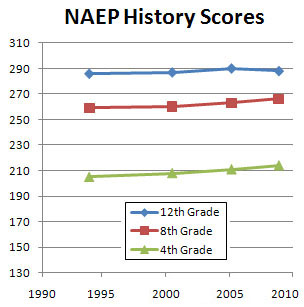 The latest NAEP scores are out showing how much our schoolkids know about U.S. history. Results from the past 16 years for three different grade levels are on the right. Quick: what’s your reaction?
The latest NAEP scores are out showing how much our schoolkids know about U.S. history. Results from the past 16 years for three different grade levels are on the right. Quick: what’s your reaction?
If you’re anything like me, it’s something like “not bad.” Fourth grade scores overall are up by about one grade level (two grade levels for blacks and Hispanics); eighth grade scores overall are up about half a grade level; and 12th grade scores are flat. (Ten points roughly equals a grade level on the NAEP test.) It’s mostly good news — moderately good news, to be sure, but in any case nothing to be wildly distressed about. Unless you’re an education wonk interviewed by the New York Times:
U.S. Students Remain Poor at History, Tests Show
American students are less proficient in their nation’s history than in any other subject, according to results of a nationwide test released on Tuesday….Over all, 20 percent of fourth graders, 17 percent of eighth graders and 12 percent of high school seniors demonstrated proficiency on the exam.
….Fewer than a third of eighth graders could answer even a “seemingly easy question” asking them to identify an important advantage American forces had over the British during the Revolution….Only 2 percent of 12th graders correctly answered a question concerning Brown v. Board of Education….“The answer was right in front of them,” [Education historian Diane] Ravitch said. “This is alarming.”
….If history is American students’ worst subject, economics is their best: 42 percent of high school seniors were deemed proficient in the 2006 economics test, a larger proportion than in any other subject over the last decade.
Something smells wrong here on a variety of counts:
- High school seniors are far more proficient in economics than history? That really sets my BS alarm flashing. Has anyone noticed that 18-year-olds have lately begun demonstrating a great grasp of economics? Anyone?
- Only 2% of high school seniors correctly answered an item about Brown? That’s crazy. There has to have been something wrong with that question.
- “Proficient” is a purely arbitrary standard. You can make it go up or down just by deciding what you think people ought to know. Are you non-proficient in high school economics if you don’t know how interest rates affect the economy? Are you non-proficient in history if you don’t know that China fought alongside North Korea in the Korean War? It all depends, doesn’t it?
- I went through the five sample questions for 12th graders, and I have serious doubts that my 12th grade self could have answered two of them. I was a pretty good student in high school, but as near as I can tell this performance would have qualified me as barely proficient.
I’m just not sure what to think here. It’s obvious that American schoolkids aren’t getting any worse at history. It’s also clear that the history profession has a very high bar for what it considers minimal proficiency in U.S. history. Beyond that, I’m not sure what these results tell us.

















